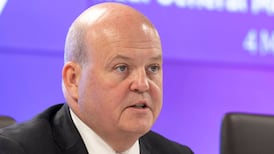THE new Northern Ireland cable company CableTel has only been selling its service for six weeks but already managing director Owen Lamont is more than happy with the response.
CableTel, which was awarded the cable licence for Northern Ireland last year, has installed its fibre-optic cable in parts of south and west Belfast, and its subcontractors are currently working in the north and east of the city.
Belfast will be cabled first, followed by other major population centres such as Derry, North Down and Ant rim.
This year, according to Mr Lamont, CableTel will invest £40 million sterling in establishing the first segment of its network, which is to reach more than 428,000 of the North's 530,000 homes by the end of the year 2003.
During the 15-year licence period the company will spend a total of £600 million and create 340 permanent jobs in the North.
The massive investment, which is being funded through a series of public share offerings by the company's US parent International CableTel, is being made without any British government grants, Mr Lamont says. CableTel, which is traded on NASDAQ, operates a number of cellular phone licences and is Britain's third largest cable operator.
About £300 million goes directly towards building the network, which will bring fibre-optic cable directly to each subscriber. This, will make CableTel's Northern Ireland system "the most advanced anywhere in the world", Mr Lamont claims. The £600 million costs associated with the 15-year licence also includes more than £200 million in fees to the British Exchequer.
Despite the large capital programme required, Mr Lamont feels that even from the early response CableTel will do very well in the North. "The appetite for cable is higher in the North than in Britain," he said. Although he is cautions against reading too much into early sales figures, Mr Lamont is clearly happy with the results.
So far the company has achieved penetration levels of between 27 and 40 per cent and six weeks into the service CableTel claims to have a total of about 2,000 customers. Although the penetration levels are low in comparison to cable companies in the Republic, they are very respectable for a fledgling British service. In the Republic the initial selling point of cable TV was crystal clear access to the British terrestrial channels, but viewers in the North have always received the British channels with a normal aerial.
However CableTel has been able to attract customers with a dual television and telephone service as its advanced broad-band fibre-optic cable system can carry both simultaneously. Domestic and business telephony are open to competition in Britain, and CableTel is already competing aggressively with British Telecom (BT), and Mercury. Six weeks into selling the service more than 90 per cent of subscribers have decided to take both the telephone and the cable television package.
The early success is based in part on competitive pricing and an aggressive marketing campaign pitched firmly against BT.
CableTel's basic "telephone plus" package offers line rental and eight channels for a monthly charge of £7.39 which it says is cheaper than the cost of BT's monthly telephone line rental.
CableTel also claims that its telephone service will offer savings of up to 20 per cent, while off peak local calls to other CableTel subscribers will cost a flat rate of less than 2p for unlimited talking time.
Mr Lamont believes that eventually "at least 40 per cent" of people in the North will have a CableTel phone line and that as the number of subscribers grows the cost of calls within the company's network will fall.
BT is the company's main competitor and Mr Lamont claims that the telecommunications giant has already begun to call customers in areas where CableTel is constructing its network to check if they are satisfied with the existing service and to persuade them to stay with BT. But the CableTel managing director is confident that he can take substantial business away from BT despite more aggressive marketing by the larger company in recent weeks.
"Customers aren't stupid ... you don't hear from them (BT) for 10 years or maybe even 30 years and then suddenly when a competitor appears you get a call," claims Mr Lamont.
Telephony is a key area of the company's business and income from phone users coupled with future information services such as home shopping, and home banking is likely to far outweigh that from cable TV. "It would be very difficult to justify a £300 million investment just to bring cable TV to Northern Ireland," he added.
Unlike many cable companies, corporate customers are a crucial market for CableTel, as the company is pitching its high-speed cable telephone network directly the Northern Ireland business community.
"Business customers are our key focus," according to Mr Lamont. He claims that the corporate response so far in south and west Belfast "has been phenomenal" particularly from small firms.
During the initial phase of construction in Belfast, CableTel has decided to "speculatively build" into a number of industrial estates because it believes it can win the business to justify the construction. "Normally companies cable area by area and if you happen to pass a business then well and good, but we are actively going after the business market." The rationale is simple. "Last week we signed a very large customer... it would take us 500 domestic customers to match that one order."
CableTel has developed separate tariff structures for both small and large business customers which offer volume discounts of between 10 and 22 per cent. The company is also offering a specific package aimed at large corporates who transfer large amounts of data between separate sites.
In the Republic, the business community benefited greatly when Telecom Eireann moved to a digital network before many other European countries. Mr Lamont argues that CableTel's creation of a broadband fibre-optic network will have a similar impact in the North.
"It will make Northern Ireland a very attractive investment location the IDB is very interested in the competitive advantage that such a network will bring".









